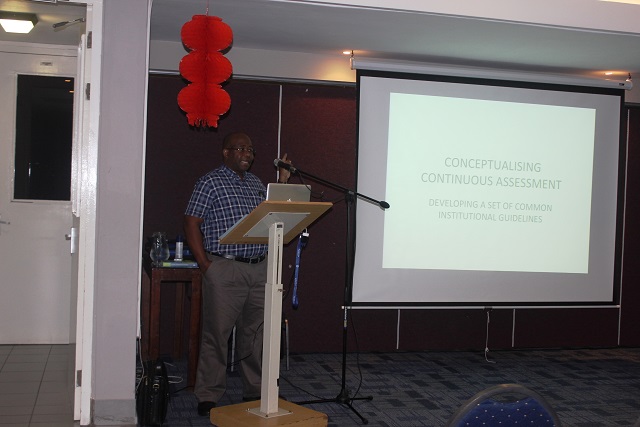Looking at how assessments are being implemented at various faculties at DUT was the main focus of the Continuous Assessment Workshop recently held at the Hotel School Conference Centre, Ritson Campus..
In conjunction with the workshop, DUT’s Audio Visual Department set up a live Webinar – a successful pilot project – which allowed various academics to listen to the issues being discussed on assessments. There was also a back channel set up where people could send their questions and answers to on the topic at hand.
The event was facilitated by Professor Thengani Ngwenya, the director of the Centre For Excellence In Learning and Teaching (CELT) at DUT. The workshop looked at assessments which is central to learning and teaching and the assessment methods used, influencing student learning.
“At DUT, there are two common forms of assessment for successful completion of modules. Those that include a final examination and those without a final examination (or continuous assessment). Practices in both these forms of assessments differ widely at DUT,” said Prof Ngwenya.
The workshop also concentrated on an interrogation of the existing theory and practices to initiate conversations that can contribute to a shared understanding of continuous assessments and the consistency in its implementation within the context of the disciplines. Prof Ngwenya delved into the various definitions of assessments and added that for students, the most important aspect in terms of their academic studies was on assessments.
In relation to this crucial topic, Prof Ngwenya’s draft position paper on assessment was also presented at the workshop which outlined and clarified the aims and purposes of continuous assessment. “We know we are not starting on a clean slate, faculties and departments are using continuous assessments but what we have noticed is that it is being used in different ways in different faculties. It is also understood differently in different departments. This is to be expected as some departments are more vocational than professional and some departments are research based. I hope to create a practical and scholarly discussion on assessment, in particular, continuous assessment at DUT. It’s going to be a long process, but we (DUT) need to start developing a common understanding on continuous assessment,” said Prof Ngwenya.
Thys Walters from the Health Sciences Faculty spoke on the Faculty’s concerns pertaining to continuous assessments and what is actually being practiced there that is specific to their faculty and their needs. “In terms of the way forward, it was agreed that faculties and departments will go through the draft position paper on continuous assessment and give their own input before an institutional set of guidelines and procedures are finalised. HoDs agreed to consult with their colleagues on the document,” said Prof Ngwenya.
– Waheeda Peters
Pictured: Professor Thengani Ngwenya, Director of the Centre For Excellence In Learning and Teaching (CELT) unit at DUT talks about assessment, which is central to learning and teaching.


